What are the useful acids of Omega- 3 and Omega-6 classes, where they are contained, how much should they consume? How does Omega-3 help lose weight?
Contents of
- Eicosapentaenoic EPA and Docosahexaenoic DHA: what is this acid in Omega-3, what role do they play in the body?
- VIDEO: The benefits of Omega-3 for the human body
- Symptoms of Omega-3 deficiency
- VIDEO: Omega-3 or fish oil
- Omega 6: what is useful for?
- Omega-3 or Omega-6 - which is better? A healthy ratio in the body of Omega-3 and Omega-6
- VIDEO: Omega-3 and Omega-6
- How to take Omega-3 on a diet?
- VIDEO: The Importance of Omega 3 for Weight Loss
Most of us know that the polyunsaturated fatty acids Omega-3 and Omega-6 are very useful and needed by the human body. Doctors advise to take them as a dietary supplement, food manufacturers as an advertising course emphasize the significant content of useful acids in their products.
But what exactly Omega-3 and Omega-6 are useful for, what the body needs, what is different, how much should be consumed and where to get them, not all have clarified for themselves. It makes sense to understand these important issues.
Eicosapentaenone EPA and Docosahexaenau DHA: What is this acid in Omega-3, what role do they play in the body?
Omega-3 is called healthy fats. This is a group of polyunsaturated fatty acids, which are essential( irreplaceable).In the human body Omega-3 is not synthesized, they can be obtained exclusively from the outside, with what is used for food.
The class of Omega-3 acids is quite numerous, but the most important for a person are:
- short-chain alpha-linolenic acid
- long-chain eicosapentaenoic and docosahexaenoic acid( EPA and DHA)
IMPORTANT: The benefits of Omega-3 for immunity have been known since the 30sXX century, cod liver oil was given to children to improve their health. At the end of the twentieth century, scientists also found that long-chain acids of Omega-3, eicosapentaenoic and docosahexaenoic, are needed for the normal functioning of the cardiovascular, nervous, endocrine, and other body systems.
Eicosapentaenoic and docosahexaenoic acids of the Omega-3 class are found in the lipids of most animal tissues. In plant tissues, they also are, but in a meager amount.
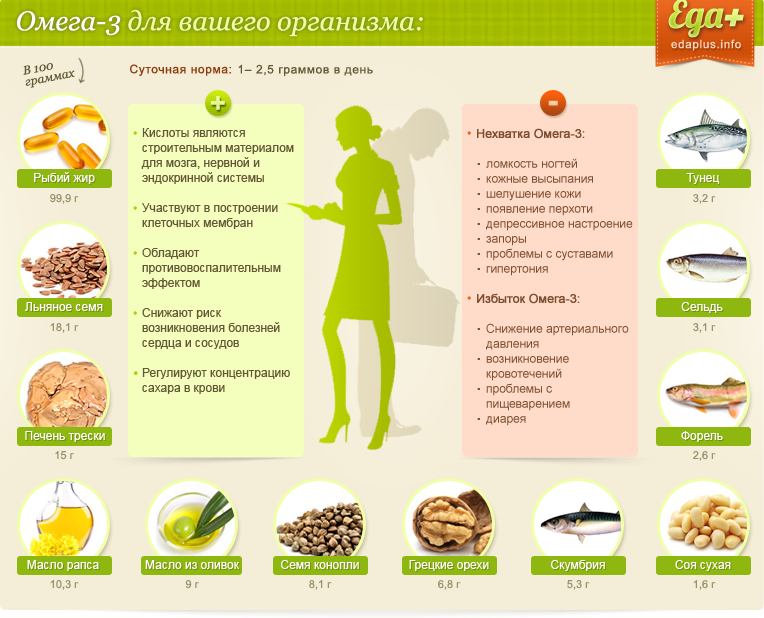 The benefits of Omega-3 and products in which acids are contained.
The benefits of Omega-3 and products in which acids are contained. In the human body, long chain EPA and DHA are the most important structural element of phospholipids and glycolides, from which cell membranes are built. Due to these acids the cells become capable of normal functioning:
- feeding
- to the growth of
- division of
IMPORTANT: Omega-3 acids, in a direct sense, are needed by every cell of our body!
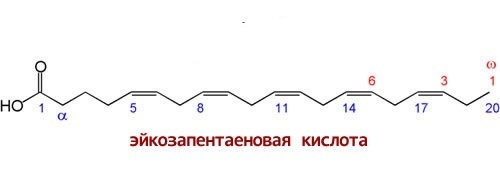 Eicosapentaenoic acid omega-3 fatty acid.
Eicosapentaenoic acid omega-3 fatty acid. The recommended daily intake of eicosapentaenoic acid for a human is 2 g.
EPC is found mainly in carcasses of salmon, halibut, mackerel, herring, sardine, and cod liver.
Forming cell membranes, EPA:
- regulates the synthesis of hormones, including prostaglandins, that provide an adequate response of the body to inflammation
- are responsible for the transport of lipids with blood
- activates the body's immune response
- optimizes the fat metabolism
- improves the absorption of fat-soluble vitamins
- acts as one of the regulatorswater-salt balance
- participates in the synthesis of germ cells
- improves heart function
- affects joint mobility
 Formula dokosaxenoic acid Omega - 3.
Formula dokosaxenoic acid Omega - 3. The recommended rate of consumption of docosahexaenoic acid is up to 3 g per day. It is also found in carcasses of salmon, halibut, mackerel, herring, sardines, cod liver.
Docosahexaenoic acid in the human body:
- participates in intrauterine development of brain and vision organs
- normalizes metabolic processes in the brain
- normalizes lipid composition of blood
- inhibits destruction of cell membranes
- inhibits atherosclerosis
- acts as a structural component of eye retina
- improves brain activity, normalizes memory, attention, learning ability
- improves the skin condition
- increases the stress resistance of the body, has an antidepressant effect
- preventsonset of oncology
IMPORTANT: It is practically impossible to obtain the norm of DHA and EPA exclusively from food products. To this end, twice - three times a week you need to eat 350 grams of the above listed fish or cod liver. Therefore, it is recommended to take Omega-3 - fish oil preparations in liquid form or in capsules.
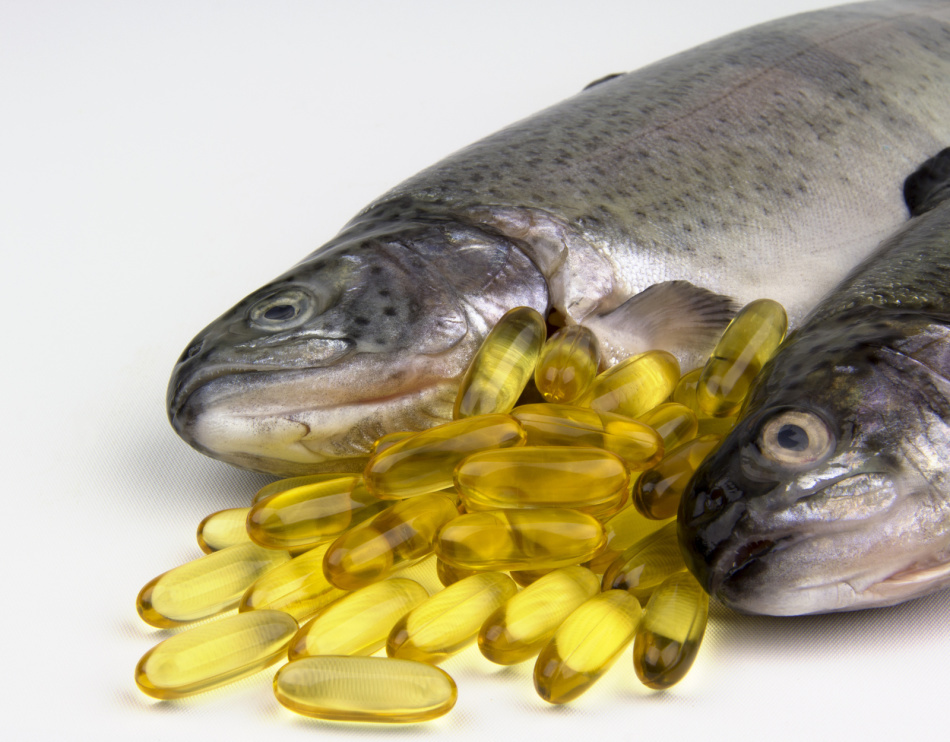 If it is not possible to get the norm of Omega-3 acids with food, it is recommended to take fish oil.
If it is not possible to get the norm of Omega-3 acids with food, it is recommended to take fish oil. VIDEO: The use of Omega-3 for the human body
Symptoms of Omega-3 deficiency
Scientists have established: Omega-3 surplus does not exist. The "bust" of DHA and EPC does not affect the body in any way.
But the shortage of useful acids can cause serious malfunctions with health. Thus, the symptoms of insufficient intake of eicosapentaic acid are:
- high blood pressure
- frequent infectious and inflammatory diseases
- dryness of the skin
- edema
- memory impairment, attention, ability to concentrate on anything
- difficulty in coordinating movements
- impaired vision
- growth retardation in children
If the human body receives EPA in too small a quantity, severe illness can develop:
- hypertension
- diabetes
- dermatitis
- bronchial asthma
- thromboses
- arthritis
- osteoporosis
- immunodeficiency status
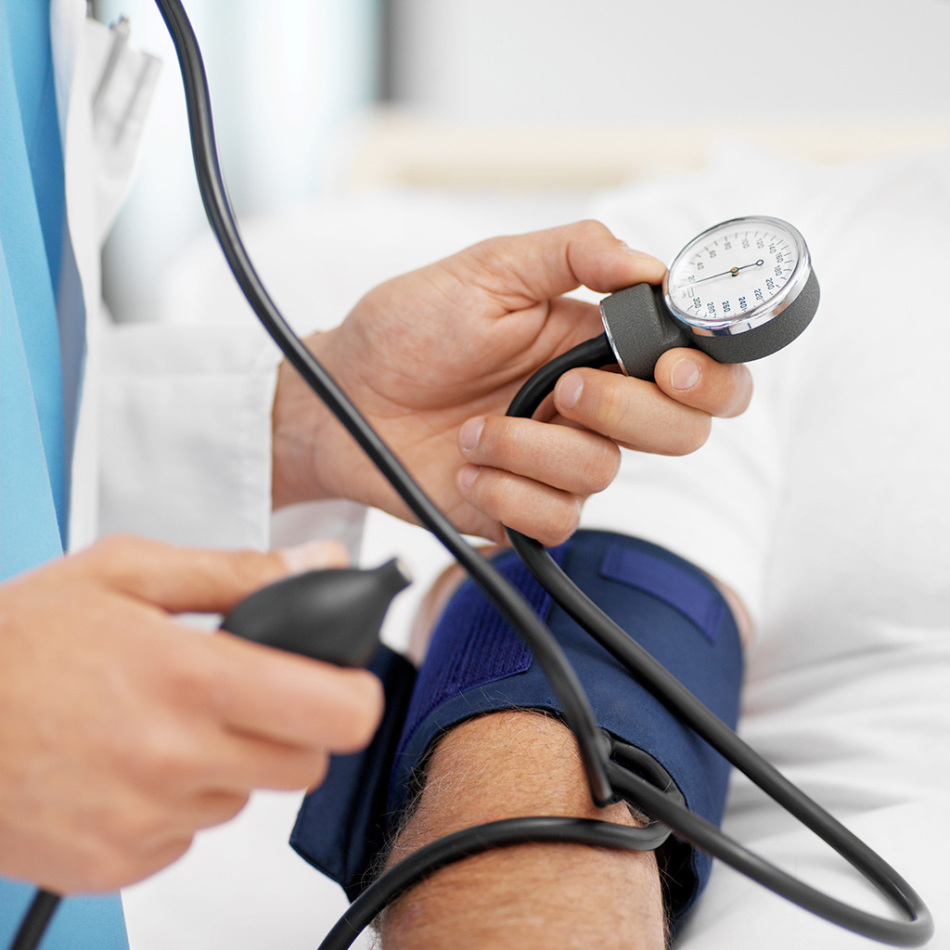 Hypertension is one of the consequences of a deficiency of EPA.
Hypertension is one of the consequences of a deficiency of EPA.If the body lacks docosahexaenoic acid, the following disruptions in its functioning are observed:
- allergy occurs
- depressive state occurs
- increases the risk of cardiovascular diseases
- aging of cells proceeds faster
- worsens brain work
- decreases learning ability in children
- increases the risk of autoimmune diseases
 Scattering and learning disabilities in schoolchildren are associated with the DGC deficit.
Scattering and learning disabilities in schoolchildren are associated with the DGC deficit. IMPORTANT: Scientists associate toxicosis in pregnant women, including late, and spontaneous abortion with deficiency of DHA.
VIDEO: Omega-3 or cod-liver oil
Omega 6: why is it useful?
Another class of polyunsaturated fatty acids required by humans is Omega-6, namely:
- linoleic
- gamma-linolenic
- arachidonic
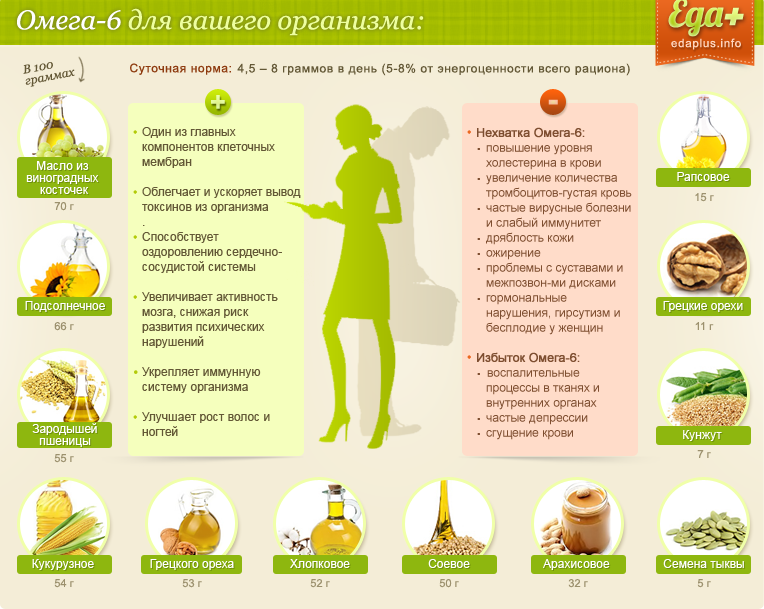 The benefits of Omega-6 and products in which acids are contained.
The benefits of Omega-6 and products in which acids are contained. Omega-6 also positively affects the functioning of all systems of the human body. For example:
- normalizes the metabolism of
- improves heart function and the state of blood vessels
- stabilizes the nervous system
- improves the condition of skin, hair and nails
- enhances immunity, other
IMPORTANT: Omega-3 acids in normal quantity are difficult to obtain, their overabundance in the diet if and what happens, then the negative effect on the body does not. Omega-6 is contained in available products, using them beyond measure is realistic, and this is fraught with health problems. The sources of Omega-6 acids are:
- vegetable oils: sunflower, corn, soybean, pumpkin, sesame, walnut
- seeds and nuts
- animal fats: egg yolk, fat, butter
Normally, an adult should consume Omega-6 in an amount up to 10 grams per day( notless than 8 g).
 Excess omega-6 is fraught with poor health and health problems.
Excess omega-6 is fraught with poor health and health problems. But the search for fatty acids of this class is fraught with:
- by raising blood pressure
- by reducing the immunity
- by developing heart and vessel diseases
- with nervous disorders
- by worsening liver function
- developing oncology
Omega-3 or Omega-6 - Which is better? A Healthy Ratio in the Body Omega-3 and Omega-6
The question of which polyunsaturated fatty acid is better, Omega-3 or Omega-6, is incorrectly posed. All of them are useful in their own way and are needed by the human body. Disregard the consumption of some at the expense of others can not, as well as compensate for the shortage of some by others.
IMPORTANT: It is necessary not only to consume Omega-3 and Omega-6 acids in a normal daily amount, but also to maintain their balance in the body. The optimal ratio of omega-6 / omega-3 polyunsaturated fatty acids is:
- 10 to 1 for healthy people
- 5 to 1, 4 to 1 and 3 to 1 for people on medical nutrition(depending on the nature of the disease)
After entering the human body, oxidized during digestion, eicosapentaic omega-3 acid and arachidonic omega-6 acid are converted into eicosanoids, mediator substances. They transmit nerve impulses from the neuron to the neuron or nerve endings to the organs.
EIC-synthesized eicosanoids also:
- have anti-inflammatory effect
- prevent the development of allergy
- dilute blood
- dilate vessels
- prevent the formation of thrombi
- lower arterial pressure
Synthesized from Omega-6 have an adverse effect on the body. Therefore, an excess of Omega-6 with Omega-3 deficiency is fraught with the appearance of inflammation and malfunctions in the metabolism.
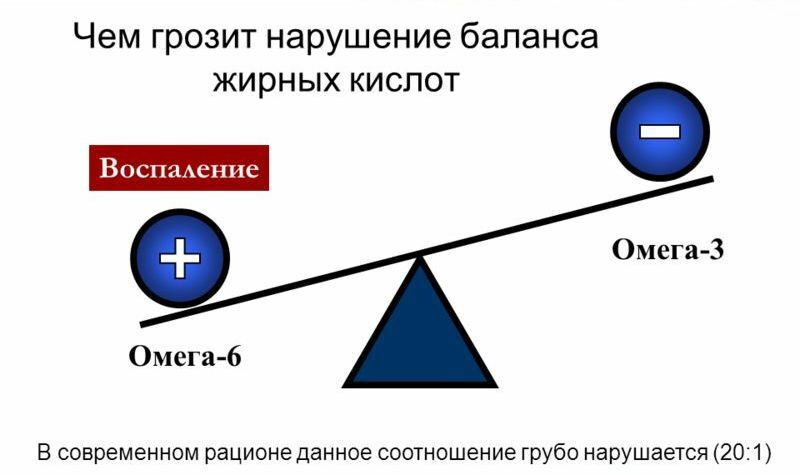 Breaking the balance of Omega-3 and Omega-6 in favor of the latter is fraught with inflammation in the body.
Breaking the balance of Omega-3 and Omega-6 in favor of the latter is fraught with inflammation in the body. IMPORTANT: In order to maintain essential fatty acids in the balance, it is necessary to rationalize the nutrition in favor of adequate but not excessive consumption of vegetable and animal fats, and consult a doctor about the advisability of using Omega-3 as a nutritional supplement, as in any form.
VIDEO: Omega-3 and Omega-6
How to take Omega-3 on a diet?
Overweight is a huge problem of our time. More than half of the men and women living in developed countries today know about it first-hand.
Nutrition experts strictly do not recommend losing weight on hungry irrational diets, taking drugs with dubious efficacy, but potentially harmful to the body. Only one food supplement they recommend - fish oil, as a source of Omega-3 acids.
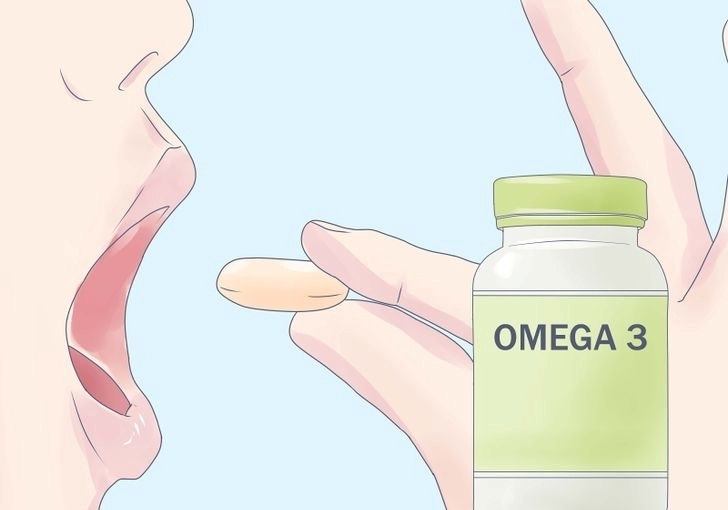 Omega-3 promote weight loss, they are recommended to drink on a diet.
Omega-3 promote weight loss, they are recommended to drink on a diet. The essence of correct weight loss is not in the sharp restriction of macronutrients, carbohydrates or fats, but in the revision of their quality. Slow carbohydrates as a source of energy - instead of fast, which are deposited by fat on the sides. Useful fats as structural elements of cell membranes and metabolic stabilizers are instead of harmful fusible ones, which promote the formation of cholesterol plaques and lead to obesity.
Omega-3 for people on a diet is simply irreplaceable, because:
- by themselves stabilize the metabolic processes
- promote the normal functioning of the immune system, other systems and organs in conditions of a limited diet of the diet
- improve the work of the liver and kidneys, therefore, help the body to remove metabolites and excess water
- increase stamina, meaning that a person can actively play sports
- blocks stress hormones, cortisol and adrenaline, which are known to contribute to the deposition of fats
According to nutritionists, a person who is losing weight should consume 4 grams of Omegaand - 3 fatty acids per day:
- regularly eat marine fish and liver
- cod drink 5 ml of fish oil per day( use up to 6 capsules)
IMPORTANT: Having decided to go on a diet, you need to clearly understand that the omega - 3 - is not a panacea. Useful acids help to lose weight, but it is impossible to reduce weight due to only them. No dietary supplements will not help, if you do not revise the diet and do not build physical activity in the norm of life.
